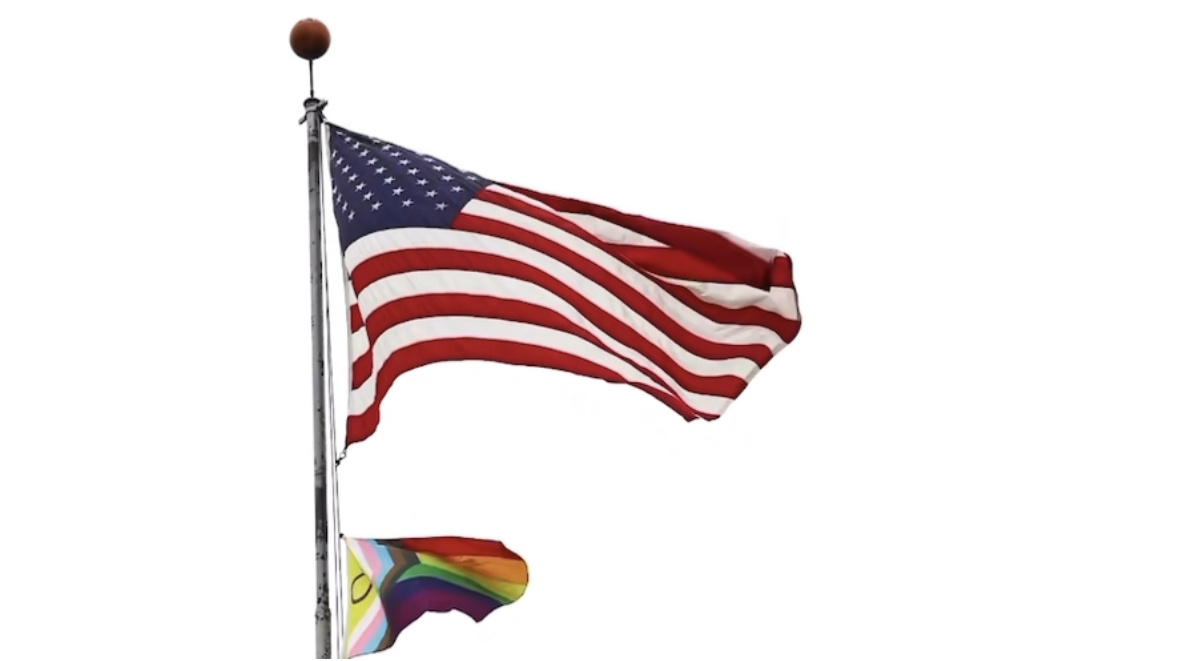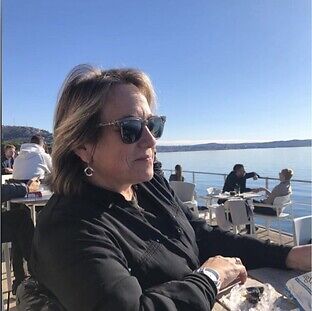Katharina Napoletano '24

Pride Month — the annual celebration of the LGBTQIA2s+ community — is a commemoration of the Stonewall Uprising in 1969 — a turning point in outlawing discriminatory laws and practices and the beginning of the gay rights movement. The Uprising was a response to a police raid of the Stonewall Inn in New York City on June 28, 1969, inciting a six-day protest against police harassment and persecution of the community.
Through parades, marches, and gatherings, Pride Month now raises awareness about equal justice and opportunity for members of the LGBTQIA2S+ community.
During Pride Month at Redlands, the University flies the Pride flag, and the University’s Memorial Chapel pillars are illuminated in rainbow colors in celebration of Pride.
Working with staff and U of R President Krista Newkirk (she/her), Iyan Barrera-Sandri (he/him, prefers to be referenced as Iyan), the University of Redlands Staff Assembly (URSA) president, worked together to implement flying the Pride flag on the University flag pole. This was the first year for the Pride flag to be flown on the main University flag pole.
Purchased by Associated Students of the University of Redlands (ASUR) in 2019, the Pride Celebration Recognition Lights were renamed to “Colors of Love” in honor of Will Wright ‘22, who passed away in November 2020. Active in LUST (Listening and Understanding Sexuality Together) and the U of R Pride Center, Will was a beloved member of the U of R community.
Overseen by Campus Diversity and Inclusion (CDI), the U of R Pride Center aims to create a safe space for people identifying in the LGBTQIA2S+ community and provides allies resources to learn more about queer identity and culture. The Pride Center also hosts student meetings, speakers, community events, and discussion groups.
Women, Gender, and Sexuality Studies Professor Addie Davidove (he/they) is the Pride Center consultant and is responsible for strengthening and expanding resources for the center.
“Pride to me is not limited to only this month, but something that exists year-round. To me, celebrating Pride means living my truth,” said Davidove, who hopes “through this role, I can offer support to LGBTQIA2S+ staff, faculty, and allies on our campus to encourage ongoing growth in our campus culture to be affirming to our LGBTQIA2S+ Bulldogs.”
He believes people can support LGBTQIA2S+ members by educating themselves on allyship and having mindful interactions and conversations.
Liz Martinez-Gonzalez ‘25 (she/they), is the Pride Center intern and public policy major and women, gender, and sexualities minor. "My biggest supporters are my friends and older brother. I will never feel ashamed for not fitting the normal stereotypes of a Latina. I am queer, and I am proud to show my true colors.” Liz has become more confident and feels as though they no longer must hide. Liz believes people can be supportive by “being respectful of people’s pronouns and by not assuming their sexuality or gender identity by the way they present themselves.”
Ari Lopez ‘24 (he/they), a psychology major with minors in English and women and gender studies, believes, “Pride is a time to remember our history and where we came from. For the longest time I believed in general history. That we existed, but quietly. It was not until I took “Queer Cultures and Identity” and “Queer Theories” at the U of R that I began to see the complexity and depth of our history. Yet through all our highs and lows, queer people continue to exist and prosper within our communities. We continue to raise our voices to the injustices around us. I could not be prouder to be a part of this community.”
Davidove said, “The last thought I would like to share is one of hope, especially to speak directly to other queer and trans-identifying folks. The history of Pride started as an act of resistance in response to the systemic injustice LGBTQIA2S+ folks face. As we are seeing a resurgence in anti-LGBTQ laws and initiatives, I want to invite/encourage resistance and care. Resistance can take many forms, but one form that deserves to be highlighted is joy as an act of resistance.”
“Embracing, celebrating, and embodying joy can both be a direct response to injustice and a restorative practice. Also, June is a great time to care for yourself and your community. You can ask yourself — how are you showing up for yourself/your community? How are you showing up for communities that you are an ally to? This month is a chance to both reflect on how we do this and then put it into action. To my queer and trans family, I have so much love and gratitude for you. Know you are not alone, you are a good person, the world is a better place because you are in it, and you are worth celebrating.”

Faculty at the U of R shared with the Bulldog Blog what Pride means to them.

Allison Fraiberg: Maybe this sounds weird, but my way of celebrating pride at this point in my life is to come out or be out as many days of the year as possible. I run our international study tours in the School of Business and Society, and I run Italian wine tours for Redlands alumni and the public in the summer, so it's important for me to be out and honest during these. Society changes for the better when people can be together honestly and without fear. That's what Pride means to me.
AF: To be a supportive ally, it's pretty simple for me: (1) Listen to my answers when you ask me questions; and (2) Believe me when I tell you about my experiences; and (3) Think about the ways in which your movement in the world isn't threatened by your sex, gender, or sexuality.
AF: I don't have a specific role model. What I do think about often are the shoulders of all the queer people I'm standing on. I know there are things I can take for granted because of all the work, joy, and agony that came before me. People battled to make my life a little easier. I hope I have been able to provide shoulders for generations after me to stand upon.
AF: For anyone at the UofR, know that you can always contact me. My door is open. In good times and especially in bad times.

Wendy McIntyreI celebrate pride month by going to events (going to Palm Springs ... even though they don't celebrate pride until November. I feel like it's always pride month in Palm Springs), wearing my pride colors and having my three dogs wear theirs as well, and saying "Happy Pride" to all. Pride month means celebrating our legacy and those who came before me that had to be silent and/or were persecuted by being LGBTQIA2S+. It is also about celebrating the US in all of our dimensions, identities, and expressions.
There are countless ways to support the community; by always being inviting to those in the community, hosting events for those in the community, using the proper pronouns if someone is willing to share theirs, and being out myself. As for being an ally, I think combating poor treatment of LGBTQIA2S+ is very important. Stepping in in in the moment when one of your LGBTQIA2S+ friends (or someone you don't even know) is being treated poorly is very effective. I think people who think of themselves being the most supportive often don't defend our community, and this is what being a true ally is to me.
WM: I have so many role models! My little brother who came out in the late 80's in a small town in Idaho (where I grew up) is my top role model. He was and is brave beyond belief and I've always looked up to him as my role model.
I think Billie Jean King and Martina Navratilova are among my top role models (both tennis players who came out when it was NOT easy to do). I don't play tennis, but love to support, and I will never forget the way they were treated for coming out. They were so brave and pushed the envelope in ways that make it easier for us to be out today. We should never forget those that paved the way. Others would be the people that "started it all" in Stonewall and refused to let themselves be badgered. I love it that the Stonewall Riots were started by a Drag Queen!
WM: I'd like to add that I'm so pleased that you asked me to add to the blog. I'm so fortunate to work at UOR where I can be out and feel respected and supported in every way!
LGBTQIA2S+ is an abbreviation for Lesbian, Gay, Bisexual, Transgender, Queer and/or Questioning, Intersex, Asexual, Two-Spirit, and the many additional gender identities, sexual orientations, and romantic orientations that fall under the umbrella. This acronym is an umbrella term that is often used to refer to the community as a whole. Our Pride Center uses LGBTQIA2S+ to intentionally include and raise awareness about Queer, Intersex, Asexual, and Two-Spirit identities as well as the myriad of communities under this umbrella.
To learn more about LGBTQIA2S+ resources, click this link.
To learn more about the Pride Center, click this link.
For coming out support, click this link.
For the Queer Dictionary, click this link.
